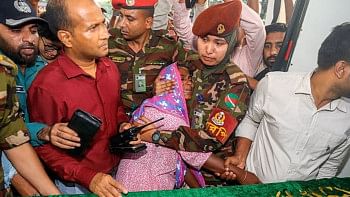‘Youth at heart of sustainable growth’
Bangladesh has a promising future with its young and dynamic workforce accelerating economic growth, but challenges like youth unemployment, skill mismatches, and climate concerns must be tackled for a sustainable and inclusive future, said experts at a discussion yesterday.
As the country prepares for Voluntary National Review (VNR) 2025, the experts stress the importance of adapting, innovating, and empowering the youth to lead the charge toward a thriving, equitable future.
"As the country prepares for the VNR 2025, which will assess its performance on the SDGs, one thing is clear—the future belongs to those who can adapt, innovate, and lead," said Debapriya Bhattacharya, distinguished fellow of the Centre for Policy Dialogue.
He made this statement while summarising the discussion of youth participants in a consultation titled "National SDG Report (VNR): Perspective of Youth", organised by the Citizen's Platform for SDGs, Bangladesh, at the Bangabandhu China Friendship Conference Centre in the capital's Agargaon.
Referring to the youth's group discussion, he said job markets are shifting, digital transformation is accelerating, and sustainability is no longer an option—it is a necessity.
To reduce inequalities, Bangladesh must ensure equal access to education, healthcare, and economic opportunities for all citizens, regardless of gender, socio-economic background, or geographical location
Yet, youth unemployment, skill mismatches, and climate concerns threaten to slow down progress, he said.
He raised the question, "Are we truly equipping the next generation to drive Bangladesh's economic growth while keeping sustainability at the core?"
"Particularly in education (SDG 4), decent work (SDG 8), and climate action (SDG 13). However, this won't happen unless businesses, policymakers, and young professionals come together with a clear agenda," he pointed out.
He also asked, "Are we investing enough in youth-led entrepreneurship, and are businesses adapting to the skills of tomorrow?"
The answers to these questions will determine whether Bangladesh moves forward or falls behind in the race for a sustainable and inclusive future, he added.
According to him, the VNR 2025 will highlight Bangladesh's progress, and the youth can play a crucial role in shaping the future of the nation.
The CPD's distinguished fellow said climate change is a major concern for Bangladesh, and it directly impacts the SDGs.
He emphasised that securing the future requires the active engagement of young people in climate action. He warned that without urgent measures, environmental challenges could threaten long-term economic stability and public health.
Addressing the programme, Shishab Quader, director general (SDG affairs) at the Chief Adviser's Office, said the youth need access to affordable and inclusive learning opportunities that prepare them for the job market.
While Bangladesh is progressing towards a digital economy, it needs more investments in innovation, start-ups, and skill development programmes, he said.
Anowarul Haq, assistant resident representative of the United Nations Development Programme, Bangladesh, encouraged entrepreneurship and ensuring equal job opportunities for all, including women and marginalised communities.
He also stressed better awareness for the youth population and access to healthcare services, particularly in rural areas.
To reduce inequalities, Bangladesh must ensure equal access to education, healthcare, and economic opportunities for all citizens, regardless of gender, socio-economic background, or geographical location, he added.
He also said marginalised communities and persons with disabilities must be included in national development plans.
Haq said the roles of the government, private sector, and civil society are crucial in driving progress towards the SDGs. However, he said, youth engagement in policymaking is still limited.
Another distinguished fellow of the CPD, Mustafizur Rahman, said the VNR 2025 should reflect the voices of young people, highlighting aspirations, challenges, and recommendations.
He emphasised the need for greater youth representation in decision-making processes and ensuring youth-centric policies.
He also said if the government and stakeholders remain committed, and if the youth take an active role in driving change, Bangladesh will achieve sustainable, inclusive, and long-term development.
He urged all to work together, raise voices, and take action for a better future.

 For all latest news, follow The Daily Star's Google News channel.
For all latest news, follow The Daily Star's Google News channel. 



Comments